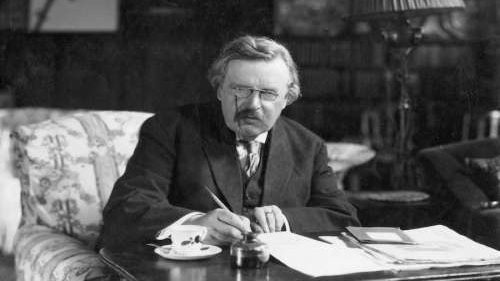A group of five friends, and scholars of the Catholic writer G.K. Chesterton, are launching an online lecture series with the hopes of sparking interest in Chesterton’s work, and infusing joy and humor into a country reeling from the coronavirus pandemic.
The series, “Tuesdays with the Troubadours”, began April 7 and is put on by the Society of Gilbert Keith Chesterton, a lay apostolate.
The presenters will offer a short talk on a topic related to the faith, followed by a panel discussion and a Q&A. Participants can sign up for the free series and receive a link to join via Zoom video conferencing.
William Fahey, president of Thomas More College of Liberal Arts in New Hampshire, told CNA that he and the other four presenters— The Troubadours— became friends as presenters at the annual Prairie Troubadour Conference, put on by the G.K. Chesterton Society and held in Fort Scott, Kansas, 160 miles east of Wichita.
The goal of the series is to recreate virtually the spirit of that conference.
“I tossed out an idea in an email exchange—almost as a fanciful thought—that all of us should just give an online conference,” Fahey told CNA.
“Everyone moved on the idea quickly...it was the fruit of friendship.”
Fahey said he hopes the friendship and levity of the group will come across online.
“Joy is of the Christian spirit,” Fahey said, citing the motto of the college he leads, which is taken from St. Paul: caritas congaudet veritati; charity rejoices in the truth.
“Catholics, especially on the cusp of darkness, can get quite melancholy and gloomy. But I think the Catholic character...is to laugh when the chips are down and ride on,” he said.
What is a troubadour, anyway?
Troubadours were medieval poets and storytellers, who went from place to place and often lived a mendicant lifestyle. St. Francis of Assisi in particular is often remembered as a “troubadour of God” for his mendicant lifestyle and joy.
Christopher Check, president of the media apostolate Catholic Answers, told CNA that his presentation, set for April 28, will focus on the importance of storytelling, especially in education.
He pointed out that many students today are fed a steady diet of practically oriented readings, with a decreased emphasis on stories that "capture the imagination and impart a moral truth."
"And yet, when Our Lord wants to impart a truth, what does he do? He tells stories," Check said.
"This is the educational device par excellence: the story. And Our Lord knew it."
Joie de vivre
Chesterton, the inspiration for the series, was born in 1874 and became a prolific writer and staunch Catholic apologist after his conversion to the faith. He is renowned for writing apologetic classics such as “Orthodoxy” and “The Everlasting Man,” as well as for his fictional “Father Brown” series, among many other works.
He died in 1936 and is remembered for his humor and wit.
Check said the virtual conference aims to whet participant's appetites for the writings of Catholic authors like Chesterton, and to be in the company of fellow Catholics “and feel that joy” when the coronavirus outbreak ends.
Joseph Pearce, another presenter and director of book publishing at the Augustine Institute, told CNA that Chesterton's way of seeing the world was and is very Catholic, because a sense of humor, infused with grace, is crucial for evangelization.
Troubadours, in a Catholic sense, have a spirit of joie de vivre that comes from faith in Christ, Pearce said.
Chesterton brought people to God through a hearty cheerfulness and jollity, with a smile on his face, Pearce said.
"Basically, the victory is already won. We, as Christians, understand that God is in charge...we really should be walking around full of that joy, the joie de vivre that comes from the joie de crist, from the joy of Christ. And if that's not present, there's something wrong," Pearce told CNA.
Fostering a troubadour attitude
The spirit of the troubadours has a rambunctiousness about it, Pearce said.
"The whole idea of the format is that the seriousness of the message is nonetheless delivered with 'levitas'— gravity with levity," he explained.
He mentioned a famous Chesterton quote from his book “Orthodoxy”: Angels can fly because they take themselves lightly.
"Yes, I want to talk about serious things, while at the same time having that Chestertonian levity," Pearce said.
"That's what we should be aiming at. What Chesterton succeeded in doing so well is something that we disciples of Chesterton should try to emulate," he said.
Lahey recommended that Catholics wishing to foster a “troubadour” attitude within themselves ought to read such authors as Chesterton, Hilaire Belloc, J.R.R. Tolkien, Robert Louis Stevenson, John Buchan— “things that are adventurous; things that make them want to live large and risk.”
Check agreed, also recommending that Catholics tend to their interior spiritual lives during the coronavirus outbreak. He recommended praying the Divine Office at home— “in that prayer, you'll see penitential psalms, but you'll also see psalms of joy,” he said.
He also encouraged Catholics to get a copy of the Mundelein Psalter and say Lauds and Vespers around the kitchen table.
"We're about to enter the Easter Season, where the feasting really just goes on and on and keeps going on, a time of great joy," he noted.
"And all of the Divine Office is going to reflect that joy. So that is a sure recommendation I would make to people."

